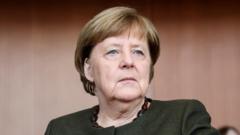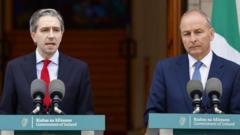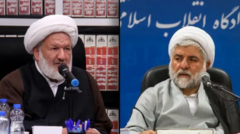Following the breakdown of coalition discussions between traditional parties, the far-right Freedom Party now stands poised to lead Austria, with Herbert Kickl expected to be appointed chancellor. His party's radical anti-immigrant stance raises concerns about the future of Austrian and European politics.
Austrian Coalition Talks Fail, Paving the Way for Far-Right Governance

Austrian Coalition Talks Fail, Paving the Way for Far-Right Governance
The collapse of coalition talks among mainstream parties in Austria could empower the far-right Freedom Party, led by controversial figure Herbert Kickl.
---
The political landscape in Austria may be set for a significant shift as coalition negotiations among mainstream parties have collapsed this weekend, granting the far-right Freedom Party a prime opportunity to dominate the government. Herbert Kickl, the outspoken leader of the Freedom Party, is on track to become the next chancellor after his party emerged victorious in the recent national assembly elections held in September.
In a pivotal meeting scheduled for Monday, President Alexander Van der Bellen is expected to confer with Kickl, thereby initiating the formal process of coalition formation. Should these discussions proceed, it would signal a major ascendant moment for far-right politics not only in Austria but across Europe.
Kickl's party, notorious for its roots in 1950s neo-Nazism and a platform steeped in anti-immigration rhetoric, pushes for stringent measures including a freeze on granting asylum applications and a ban on citizenship for asylum seekers. His campaign has cast immigrants in a negative light, dubbing them as detrimental to the state’s welfare system. The party’s promotional material often evokes imagery linked to the rise of fascism, reflecting deep-seated nationalistic sentiments.
In a surprising turn, leaders from the conservative Austrian People’s Party (ÖVP) have indicated willingness to enter coalition discussions with the Freedom Party, a decision that contradicts prior commitments to avoid partnership with the group as long as Kickl remained at the helm. This potential collaboration could unleash significant changes within Austria’s governance structure that may reshape the political discourse for years to come.
The political landscape in Austria may be set for a significant shift as coalition negotiations among mainstream parties have collapsed this weekend, granting the far-right Freedom Party a prime opportunity to dominate the government. Herbert Kickl, the outspoken leader of the Freedom Party, is on track to become the next chancellor after his party emerged victorious in the recent national assembly elections held in September.
In a pivotal meeting scheduled for Monday, President Alexander Van der Bellen is expected to confer with Kickl, thereby initiating the formal process of coalition formation. Should these discussions proceed, it would signal a major ascendant moment for far-right politics not only in Austria but across Europe.
Kickl's party, notorious for its roots in 1950s neo-Nazism and a platform steeped in anti-immigration rhetoric, pushes for stringent measures including a freeze on granting asylum applications and a ban on citizenship for asylum seekers. His campaign has cast immigrants in a negative light, dubbing them as detrimental to the state’s welfare system. The party’s promotional material often evokes imagery linked to the rise of fascism, reflecting deep-seated nationalistic sentiments.
In a surprising turn, leaders from the conservative Austrian People’s Party (ÖVP) have indicated willingness to enter coalition discussions with the Freedom Party, a decision that contradicts prior commitments to avoid partnership with the group as long as Kickl remained at the helm. This potential collaboration could unleash significant changes within Austria’s governance structure that may reshape the political discourse for years to come.























